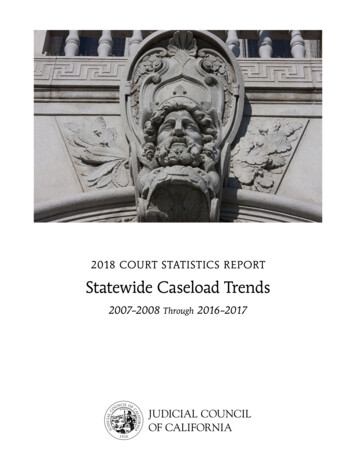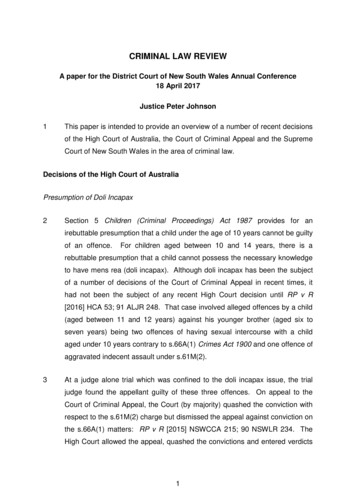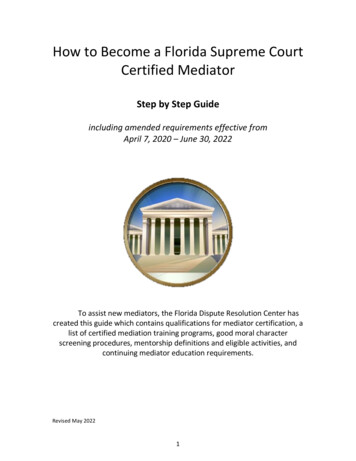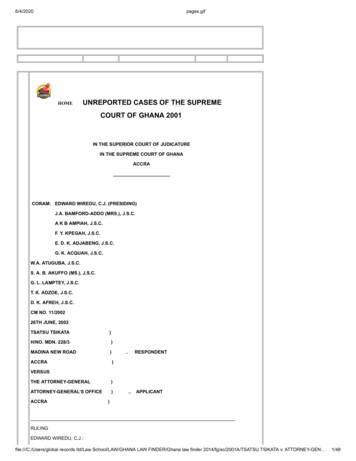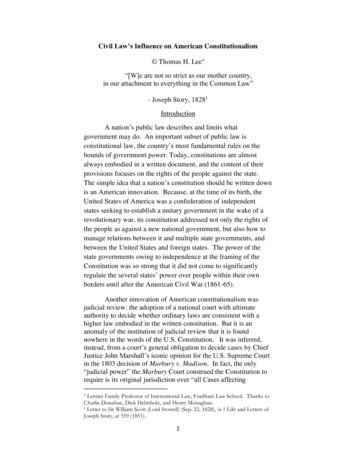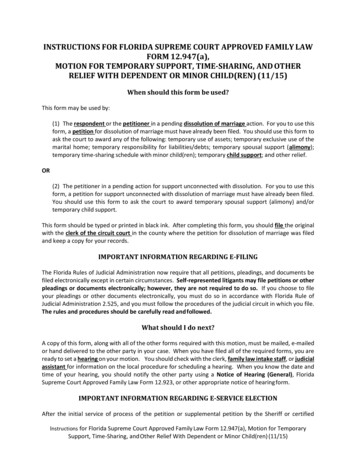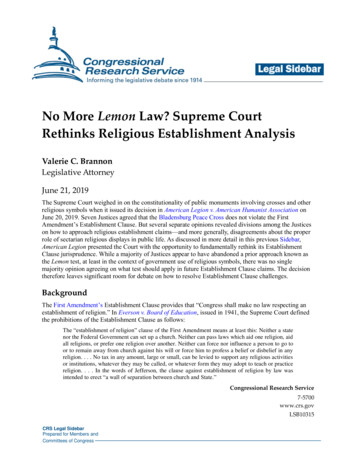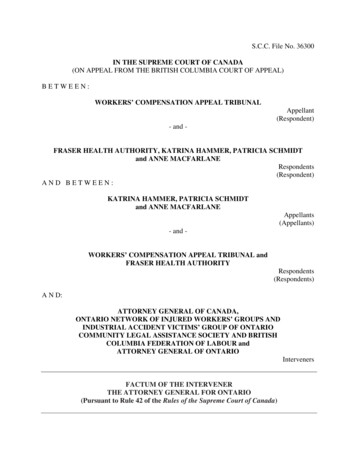
Transcription
S.C.C. File No. 36300IN THE SUPREME COURT OF CANADA(ON APPEAL FROM THE BRITISH COLUMBIA COURT OF APPEAL)BETWEEN:WORKERS’ COMPENSATION APPEAL TRIBUNALAppellant(Respondent)- and -FRASER HEALTH AUTHORITY, KATRINA HAMMER, PATRICIA SCHMIDTand ANNE MACFARLANERespondents(Respondent)AND BETWEEN:KATRINA HAMMER, PATRICIA SCHMIDTand ANNE MACFARLANEAppellants(Appellants)- and -WORKERS’ COMPENSATION APPEAL TRIBUNAL andFRASER HEALTH AUTHORITYRespondents(Respondents)A N D:ATTORNEY GENERAL OF CANADA,ONTARIO NETWORK OF INJURED WORKERS’ GROUPS ANDINDUSTRIAL ACCIDENT VICTIMS’ GROUP OF ONTARIOCOMMUNITY LEGAL ASSISTANCE SOCIETY AND BRITISHCOLUMBIA FEDERATION OF LABOUR andATTORNEY GENERAL OF ONTARIOIntervenersFACTUM OF THE INTERVENERTHE ATTORNEY GENERAL FOR ONTARIO(Pursuant to Rule 42 of the Rules of the Supreme Court of Canada)
MINISTRY OF THE ATTORNEY GENERALCrown Law Office - Civil720 Bay Street, 8th FloorToronto, Ontario M7A 2S9Fax: 416-326-4181Sara Blake (LSUC# 25251P)Tel:416-326-4155Email: sara.blake@ontario.caSandra Nishikawa (LSUC# 42318F)Tel:416-212-4344Email: sandra.nishikawa@ontario.caBURKE-ROBERTSON LLPBarristers & Solicitors441 MacLaren Street, Suite 200Ottawa, Ontario K2P 2H3Robert E. Houston, Q.C.Tel:613-236-9665Fax: 613-233-4195 or 613-235-4430Email: rhouston@burkerobertson.comOttawa Agent for the Intervener,the Attorney General for OntarioCounsel for the Intervener,the Attorney General for OntarioORIGINAL TO:THE REGISTRARCOPIES TO:WORKERS’ COMPENSATION APPEALTRIBUNAL4600 Jacombs Road, Suite 150Richmond, British Columbia V6V 3B1Timothy J. MartiniukTel:604-664-7800Fax: 604-713-0443Email: tim.martiniuk@wcat.bc.caCounsel for the Appellant/Respondent,Workers’ Compensation Appeal TribunalHARRIS & COMPANYBarristers & Solicitors550 Burrard Street, Suite 1400Vancouver, British Columbia V6C 2B5Nazeer T. MithaTel:604-684-6633Fax: 604-684-6632Email: nmitha@harrisco.comCounsel for the Respondent,Fraser Health AuthorityBORDEN LADNER GERVAIS LLPBarristers & SolicitorsWorld Exchange Plaza100 Queen Street, Suite 1300Ottawa, Ontario K1P 1J9Nadia EffendiTel:613-237-5160Fax: 613-230-8842Email: neffendi@blg.comOttawa Agent for the Appellant/Respondent,Workers’ Compensation Appeal TribunalGOWLING LAFLEUR HENDERSONLLPBarristers & Solicitors160 Elgin Street, Suite 2600Ottawa, Ontario K1P 1C3Jeffrey W. BeedellTel:613-233-1781Fax: 613-563-9869Email: jeff.beedell@gowlings.comOttawa Agent for the Respondent,Fraser Health Authority
HEALTH SCIENCES ASSOCIATION OFBRITISH COLUMBIA180 East Columbia StreetNew Westminster, British Columbia V3L 0G7Tel:604-617-0094Fax: 604-515-8889Randall NoonanEmail: rnoonan@hsabc.orgTonie BeharrellEmail: tbeharrell@hsabc.orgCounsel for the Respondents/Appellants,Katrina Hammer, Patricia Schmidt andAnne MacFarlaneATTORNEY GENERAL OF CANADA130 King Street West, Suite 3400The Exchange Tower, Box 36Toronto, Ontario M5X 1K6Tel:416-973-4111Fax: 416-952-4518Christine MohrEmail: christine.mohr@justice.gc.caAlexander PlessEmail: alexander.pless@justice.gc.caGOWLING LAFLEUR HENDERSONLLPBarristers & Solicitors160 Elgin Street, Suite 2600Ottawa, Ontario K1P 1C3Matthew S. EstabrooksTel:613-233-1781Fax: 613-563-9869Email: matthew.estabrooks@gowlings.comOttawa Agent for the Respondents/Appellants,Katrina Hammer, Patricia Schmidt and AnneMacFarlaneATTORNEY GENERAL OF CANADA50 O’Connor Street, Suite 500, Room 557Ottawa, Ontario K1A 0H8Christopher M. RuparTel:613-670-6290Fax: 613-954-1920Email: christopher.rupar@justice.gc.caOttawa Agent for the Intervener,the Attorney General of CanadaCounsel for the Intervener,the Attorney General of CanadaIAVGO COMMUNITY LEGAL CLINIC489 College Street, Suite 203Toronto, Ontario M6C 1A5Tel: 416-924-6477Fax: 416-924-2472Ivana PetriconeEmail: petricoiv@lao.on.caMaryth YachninEmail: m yachnin@lao.on.caJoel SchwartzEmail: j schwartz@lao.on.caCounsel for the Interveners,Ontario Network of Injured Workers’ Groupsand Industrial Accident Victims’ Groupof OntarioCOMMUNITY LEGAL SERVICESOTTAWA CARLETON1 Nicholas Street, Suite 422Ottawa, Ontario K1N 7B7Michael BossinTel:613-241-7008 ext. 224Fax: 613-241-8680Email: bossinm@lao.on.caOttawa Agent for the Interveners,Ontario Network of Injured Workers’ Groupsand Industrial Accident Victims’ Groupof Ontario
ETHOS LAW GROUP LLP470 Granville Street, Suite 1124Vancouver, British Columbia V6C 1V5JURISTES POWER130, rue Albert, Bureau 1103Ottawa, Ontario K1P 5G4Monique Pongracic-SpeierTel: 604-569-3022Fax: 866-591-0597Email: monique@ethoslaw.caJustin DuboisTel:613-702-5560Fax: 613-702-5560Email: jdubois@juristespower.caCounsel for the Interveners,Community Legal Assistance Society andBritish Columbia Federation of LabourOttawa Agent for the Intervener,Community Legal Assistance Society andBritish Columbia Federation of Labour
TABLE OF CONTENTSPART I -OVERVIEW .1PART II -INTERVENER’S POSITION ON THE QUESTIONS IN ISSUE .1PART III -STATEMENT OF ARGUMENT .1A.Statutory Authority to Reconsider a Prior Decision .2B.Policy Reasons for Procedural Flexibility as to Whether to Reconsider aDecision .3C.The Doctrine of Functus Officio Should Not be Applied to the TribunalContext .5D.The Court’s Deferential Standard of Review and Use of the Word“Jurisdictional” Do Not Apply in the Context of Tribunal’s Reconsiderationof its Own Decisions .8E.Reconsideration by the Same Panel or a Different Panel .9F.Which Decision is Subject to Judicial Review .10G.Conclusion .10PART IV -COSTS (NOT APPLICABLE) .10PART V -REQUEST FOR ORAL ARGUMENT .10PART VI -TABLE OF AUTHORITIES . xiiPART VII - STATUTES AND REGULATIONS . iiiStatutory Powers Procedure Act, R.S.O. 1990, c. S-22, s. 21.2. . iiiWorkplace Safety and Insurance Act, 2007, S.O. 1997, c. 16, Sched. A, ss. 129, 174. . iv
1FACTUM OF THE INTERVENER,ATTORNEY GENERAL FOR ONTARIOPART I 1.OVERVIEWThe Attorney General for Ontario (“Ontario”) intervenes to address the issues relating toan adjudicative tribunal’s reconsideration of its own decisions. Ontario takes no position onquestions relating to the standard of proof.PART II 2.INTERVENER’S POSITION ON THE QUESTIONS IN ISSUEOntario submits that:a.There are good policy reasons why tribunals should be allowed proceduralflexibility to decide whether to reconsider their decisions and why the common lawdoctrine of functus officio should not be imposed on tribunals by the court;b.The deferential standard of review applied by courts when reviewing tribunaldecisions and the court’s interpretation, in that context, of the word “jurisdictional”should not be applied in the context of a tribunal that is reconsidering its own decisions;c.A tribunal chair’s choice of the members who will reconsider a prior decision ofthe tribunal is within the chair’s administrative mandate; andd.The court may review both the tribunal’s first decision and its reconsiderationdecision because judicial review is applied to the outcome of a tribunal process.PART III 3.STATEMENT OF ARGUMENTReconsideration should be regarded as a procedural tool that can enhance the ability of anadjudicative tribunal to perform its statutory mandate, to provide procedural fairness to personswho are affected by its decisions and, ultimately, to achieve better outcomes than are achievedby the low standard of reasonableness applied by the court on judicial review. On matters ofprocedure that are not prescribed or restricted by statute, tribunals are typically given proceduralflexibility, subject to review by the court if a party’s procedural rights are prejudiced.
2A.Statutory Authority to Reconsider a Prior Decision4.The first question is whether the tribunal has express statutory authority to reconsider itsdecisions and the scope of that authority.5.In Ontario, section 21.2 of the Statutory Powers Procedure Act (“SPPA”) authorizesevery adjudicative tribunal to adopt a statutory power to review any of its decisions “if itconsiders it advisable” and to confirm, vary, suspend or cancel the decision. 1 Tribunals maydecide whether to adopt this power but, if they do, they must make rules governing the processfor reconsideration. The rules of the tribunals that have opted into this review power set out thescreening test that they apply to a request made by a party for review a decision.6.Some tribunals’ home statutes grant authority to reconsider, without any requirement tomake rules. For example, the Ontario equivalent of the British Columbia Workers CompensationAppeal Tribunal (“WCAT”) is the Workers’ Safety Insurance Appeals Tribunal (“WSIAT”),which has express statutory power to reconsider its decisions. The Workplace Safety andInsurance Act states: “[t]he Appeals Tribunal may reconsider its decision and may confirm,amend or revoke it. The tribunal may do so at any time if it considers it advisable to do so.” 27.These Ontario provisions effectively displace the functus officio doctrine. 3 As SimmonsJ.A. of the Ontario Court of Appeal said in Jacobs Catalytic, “where the legislature has seen fitto give an administrative tribunal a reconsideration power, the existence of that power signalsthat other considerations trump the importance of finality in relation to the work of thetribunal.” 41Statutory Powers and Procedures Act, R.S.O. 1990, c. S-22, s. 21.2.Workplace Safety and Insurance Act, 2007, S.O. 1997, c. 16, Sched. A, s. 129. Ontario takes no position onwhether the authority to amend a final decision, granted by s.253.1(1) to (4) of the B.C. Act, should be interpreted asa restriction on WCAT’s authority to reopen an application under s. 253.1(5) of that Act or otherwise.3Jacobs Catalytic Ltd. v. International Brotherhood of Electrical Workers, Local 353, 2009 ONCA 749, [2009] O.J.No. 4501 at ¶ 96 (C.A.) (Simmons J.A. concurring).4Jacobs Catalytic, ibid at ¶ 101.2
3B.Policy Reasons for Procedural Flexibility as to Whether to Reconsider a Decision8.There are good policy reasons why a tribunal should have procedural flexibility toreconsider its decisions, in the absence of statutory restrictions. Reconsideration should be seenas an additional procedural tool to enhance a tribunal’s ability to engage in questions of policyand statutory interpretation and to endeavour to serve the public interest purposes of the statute.9.If the tribunal has a policy-making role, both the statutory mandate and the administrationof justice are better served if the tribunal is consistent on policy questions. Given the deferentialstandard of review applied by the courts to tribunal decisions on questions of policy, both thetribunal and the parties need other practical processes by which a tribunal may achieveconsistency on policy questions. 5 A broad reconsideration power meets this need.10.The Russell decision of the Ontario Court of Appeal provides an example in which theOntario Municipal Board had, on reconsideration, reversed a decision on the ground that it wasinconsistent with Board policy. The Court recognized that the Board is very different from acourt because of its function to make and apply policies. The Court noted that reconsiderationmay be the only way to correct errors given the narrow statutory right of appeal to the court withleave on a question of law. The Court said, “On the whole, courts have been mindful of theuniqueness of the power of review in administrative proceedings and have been loath to interpretthe power narrowly.” The Court set aside the ruling of the Divisional Court that the review paneldid not have authority to substitute its opinion for that of the first panel, saying, “[t]he effect ofthe decision by the Divisional Court was to strip the Board of its policy-making role.” 611.Similarly, on questions of statutory interpretation to which the court applies a deferentialstandard of review, a tribunal needs an internal process to achieve consistency. 7 Both thestatutory purposes and the administration of justice are better served by consistent interpretationof statute. Ability to reconsider its decisions provides both the tribunal and the parties with aprocedural tool to address inconsistencies on questions of statutory interpretation.5Ellis-Don Ltd. v. Ontario (Labour Relations Board), 2001 SCC 4, [2001] S.C.J. No. 5 at ¶ 28.Russell v Toronto (City), [2000] O.J. No. 4762 at ¶ 14-20 (CA) leave to appeal to SCC denied.7Ellis-Don, supra note 5.6
4Reconsideration is also important to the integrity of the administrative process because it may bethe only way to resolve issues where no right of appeal is provided or where it is limited. 812.The question before the British Columbia WCAT concerned the standard of proof ofcausation of illness. That is a mixed question of statutory interpretation and policy with respectto the weighing of evidence. Given that a tribunal ruling on a question of this nature may set aprecedent 9 and given that the Court typically accords deference to any reasonable interpretationof a home statute by a tribunal, authority to reconsider provides a process by which a tribunal candetermine a consistent tribunal approach to the question.13.In Consolidated Bathurst, this Court specifically recognized the need for a tribunal toachieve consistency on policy questions by endorsing the practice by which a hearing panel mayconsult their colleagues on policy questions prior to the release of a decision in a particular case.However, the Court ruled that this internal consultation process must be voluntary – the hearingpanel must have a choice whether to consult their colleagues prior to making their decision. 1014.Reconsideration is an additional procedure by which a tribunal can achieve consistencyon important questions of policy. It may be regarded by a tribunal as preferable to allowinginconsistency to persist while the issue is worked out through the adjudication of individual casesby different panels who disagree on the question. It also provides a process by which parties maybring inconsistencies to the attention of the tribunal and request that they be addressed.15.The reconsideration process is an open and transparent method of deciding these issues.The parties receive the original panel’s decision and are entitled to procedural fairness onreconsideration. This process does not raise the concerns expressed in Consolidated Bathurst asto a parties’ right to a decision by the panel who heard their case and the freedom of the panelmembers to decide in accordance with the member’s own conscience and opinions because theparties receive that decision.8Russell, supra note 6, at ¶ 16.Even though the principle of stare decisis does not apply to tribunals, consistency in matters of law and policyprovide stability and certainty for persons who are subject to the tribunal’s statutory mandate. Many tribunals takecare to avoid departing from prior pronouncements on significant matters of law and policy without good reason.10IWA v Consolidated-Bathurst Packaging Ltd., [1990] 1 S.C.R. 282.9
516.To restrict tribunal reconsideration would increase the need for court proceedings, whichare more expensive for the parties and, if successful, less expeditious than correction of theproblem by the tribunal. Both the purpose of a statutory scheme for workers’ compensation andthe principles of administrative law generally encourage the adjudication of disputes byspecialized tribunals without the need to resort to courts. 11C.The Doctrine of Functus Officio Should Not be Applied to the Tribunal Context17.This Court in Ellis-Don recognized a presumption of regularity in tribunal procedureseven where a tribunal changes its mind. 12 The application to tribunals of the common lawdoctrine of functus officio reverses this presumption. The doctrine was developed by appellatecourts to preclude lower courts from continuing to re-hear their decisions after their authority tore-hear was transferred by the Judicature Act to the appellate division and limitation periods forappeal had been enacted. Its purpose was to protect the authority of the newly-created appellatedivision and to prevent parties from circumventing the new limitation periods by seeking a rehearing. 13 Though the doctrine is now cited to prevent parties from re-litigating, it is notnecessary in light of the doctrines of res judicata, issue estoppel and abuse of process. If atribunal fails to control re-litigation, judicial review is available. There is no need to impose thedoctrine of functus officio to supervise tribunals.18.The doctrine of functus officio continues to be applied to prevent a court, on its ownmotion, from reconsidering its decision. In Doucet-Boudreau, the dissenting judges explained,“If a court is permitted to continually revisit or reconsider final orders simply because it haschanged its mind or wishes to continue exercising jurisdiction over a matter, there would neverbe finality to a proceeding.” 14 Ontario submits that, in the tribunal context, this concern is betteraddressed by the application on judicial review of principles of procedural fairness and thedoctrine of abuse of process. Given the presumption of regularity, tribunal reconsideration oftheir own decisions should not be restricted on a blanket basis.11Reasons for Judgment of Newbury J.A. (dissenting) dated December 18, 2014 at ¶ 66, Joint Appeal Record, Vol.I, Tab 5 at pp. 134-35.12Ellis-Don, supra note 5, at ¶ 33.13Chandler v Alberta Ass’n of Architects, [1989] 2 S.C.R. 848 at 860; St. Nazaire Co., (1879) 12 Ch.D. 88.14Doucet-Boudreau v. Nova Scotia, 2003 SCC 62, [2003] 3 S.C.R. 3 at ¶ 115.
619.A significant difference between a court and an adjudicative tribunal relates to thetribunal’s statutory mandate. In most cases, a tribunal is not simply adjudicating a privatedispute. It is performing a statutory mandate to further the public interest purposes of its statute.Even in those cases where the tribunal’s mandate is the efficient processing of adjudication of alarge volume of small private disputes, such as between landlords and tenants, the tribunalapplies public policy in accordance with a statutory mandate. 1520.For this reason, this Court in Chandler said that the principle of functus officio should notbe strictly applied where there are indications in the statute that a decision can be reopened inorder to enable the tribunal to discharge the function committed to it by enabling legislation. TheCourt held that a tribunal may reconsider a decision that has been quashed by the court, even inthe absence of a statutory power to reconsider, in order to complete its statutory task. 1621.Ultimately, the tribunal has a duty to perform its statutory mandate. Common lawprinciples should not be applied to restrict the ability of a tribunal to reconsider a decision whereit considers it advisable to do so in order to fulfill this mandate.22.The Respondent Fraser Health Authority argues that WCAT does not have any inherentpower or authority to reconsider its decisions. Ontario agrees that tribunals are creatures ofstatute and their decisions must be based on statutory authority but submits that the concept of“inherent power” applies only to substantive remedial authority; that is, tribunals have noinherent power to make orders or grant remedies of a substantive nature. Tribunals do not needinherent powers to determine matters of procedure such as whether to reconsider a decision.Tribunals are given flexibility to set their own procedure, so long as it is fair to the parties andcomplies with statutory requirements. 1723.Reconsideration is properly characterized as a matter of procedure because a ruling that adecision will be reconsidered does not affect the substantive rights of the parties. It simply givesthe parties an opportunity to persuade the tribunal to alter the substantive decision. It is no15See e.g. Residential Tenancies Act, 2006, S.O. 2006, c. 17, ss. 1, 201, 202, 204, 205, 209.Chandler, supra note 13, 848 at 854 – 863, 868.17Baker v. Canada (Minister of Citizenship and Immigration), [1999] 2 S.C.R. 817 at ¶ 27; Council of Canadianswith Disabilities v. Via Rail Canada Inc., 2007 SCC 15, [2007] S.C.J. No. 15 at ¶ 231.16
7different from any other procedure that gives parties an opportunity to persuade the tribunal onsubstantive issues. The risk that the tribunal might be persuaded to alter its substantive decisiondoes not change the character of reconsideration from a matter of procedure to one of substance.24.Concerns have been expressed that tribunals may abuse a broad discretion to reconsiderand that permitting parties to request reconsideration will lead to an endless cycle ofreconsideration litigation without finality. These concerns are not supported by Ontario’sexperience. Since 1995, when the SPPA gave all Ontario adjudicative tribunals authority toreview their own decisions if they “consider it advisable”, there have been no court decisionsfinding a tribunal to have abused this authority.25.Finality is important because parties are entitled to govern their affairs in reliance upon afinal tribunal decision. Nonetheless, in Grillas, this Court ruled that, until the order is executed,the Board is entitled to reopen its decision and, if it sees fit to do so, to revise it. 18 Section21.2(2) of the SPPA requires that a review take place within a reasonable time after the decisionor order is made. What is reasonable depends on the circumstances of each case and may includeconsideration of any steps that a party has taken in reliance on the decision. Some tribunal rulesimpose short time limits on requests for reconsideration. The tribunals whose statutes state that atribunal decision is final and binding rely on this provision to refuse requests for reconsiderationthat are not supported by strong grounds. They also rely on common law doctrines such as issueestoppel to preclude attempts by parties to re-litigate.26.The concerns assume without any basis that tribunals will fail to control their ownprocesses. Tribunals that have adopted the power of review granted by s. 21.2 of the SPPA arerequired by that section to make rules governing reconsideration. The rules that tribunals havemade set out the test that each tribunal applies to screen requests for reconsideration. 19 Othertribunals such as WSIAT, that are not required to make rules, have issued practice directions. 2018Grillas v. Canada (Minister of Manpower and Immigration), [1972] S.C.R. 577 at 582.See e.g.: Landlord and Tenant Board Rules of Practice, R 29 and Interpretation Guideline G8; Rules of Practiceand Practice Directions of the Environmental Review Tribunal, R. 232-243; Criminal Injuries Compensation BoardRules of Procedure, R. 9; Assessment Review Board Rules of Practice and Procedure, R 140-146.20Workplace Safety and Insurance Act, 2007, S.O. 1997, c. 16, Sched. A, s. 129, WSIAT Practice Direction,Reconsiderations; WSIAT Decision No. 871/02R2, 2006 WSIAT 3023; Ontario Municipal Board Act, R.S.O. 1990,c. O.28, s. 43 and OMB r. 110-119; Russell, supra note 6, at ¶ 10-13.19
8This screening is important to the tribunal’s ability to control its processes by preventing relitigation without good reason, while enabling the tribunal to perform a type of quality controlthat enhances its ability to fulfill its statutory mandate.27.It is important to note that whether to reconsider is at the discretion of the tribunal. Aparty does not have a right to reconsideration. The WSIAT Practice Direction notes that requestsfor reconsideration are rarely granted. 21 If the tribunal refuses a request to reconsider, the partymay still pursue a statutory right of appeal of the original decision 22 or, if there is no statutoryright of appeal, judicial review of that decision.D.The Court’s Deferential Standard of Review and Use of the Word “Jurisdictional”Do Not Apply in the Context of Tribunal’s Reconsideration of its Own Decisions28.If a tribunal decides to reconsider a question of policy or of statutory interpretation,Ontario submits that the Court should not require the tribunal to apply a Dunsmuir-type standardof review to its own decision. The deferential standard of review was developed to balance thetension between the constitutional role of the court to uphold the rule of law and the need toavoid undue interference with the discharge of administrative functions in respect of the mattersdelegated to administrative bodies by the legislatures. 23 This basis for deference has noapplication within a tribunal when reconsidering its own decision because the tribunal’s duty toperform its statutory mandate should govern the standard of review to be applied by it to its ownprior decisions. Thus, if a tribunal has decided to reconsider its decision, it may be appropriate todetermine afresh the question of law or policy on the basis of proper analysis of the statute,informed by the statutory purposes and the tribunal’s policy and experience of the circumstancesin which the statute operates. 24 While the tribunal’s original decision may be influential, thereviewing panel should not owe any obligation of deference to it. 2521WSIAT Practice Direction, Reconsiderations, § 2.1.Subject to the applicable statutory limitation period.23Dunsmuir v. New Brunswick, 2008 SCC 9, [2008] 1 S.C.R. 190 at ¶ 27.24See e.g. Hall v Ontario (Minister of Community and Social Services), [1997] O.J. No. 5212 at ¶ 31 (Div. Ct.)where the Court held that the Commission had improperly fettered its discretion on reconsideration.25If there is a duty to provide reasons for decision, the reviewing panel should give reasons explaining why it isamending or setting aside the original decision.22
929.Similarly, the context in which this Court has used and interpreted the word“jurisdictional” is in the development of a standard of review of tribunal decisions that canaccomplish the constitutional role of the court in a manner that is respectful of the policy choicesof the legislatures. This context is very different from the statutory context of the word in thisappeal. 26 “Jurisdictional” is a word that can have different meanings in different contexts.Normally, a statutory word takes its meaning from its statutory context and is interpreted inaccordance with the principles of statutory interpretation, which, in the present context, includesan interpretation conducive to enabling the tribunal to perform its statutory mandate.E.Reconsideration by the Same Panel or a Different Panel30.The assignment of members to hearing panels is generally regarded as part of a Chair’sadministrative mandate, subject only to statutory requirements as to quorum or prescribedmember qualifications. Some statutes explicitly confer this mandate on the Chair, as is done bythe British Columbia statute now before the Court. 2731.This Court in Grillas ruled that the law does not require the second hearing to be heldbefore the same panel. 28 The Ontario Divisional Court, in Landau, ruled that reconsideration bythe same panel does not give rise to a reasonable apprehension of bias. 29 The question as towhether a decision should be reconsidered by the same panel or a different panel should be leftto the Chair to decide. The considerations that guide a Chair turn on the purposes of thereconsideration, as well as practical considerations such as those described in the factum of theappellant WCAT. To let the Chair manage panel assignments is consistent with the practice ofallowing tribunals latitude in matters of procedure subject to judicial review only if a party’sprocedural rights are prejudiced by the choice.26See Robert W. Macaulay, Q.C. & James L.H. Sprague, Practice and Procedure Before Administrative Tribunals,looseleaf, vol. 3 (Toronto, ON: Thomson Canada Ltd, 2004) at 27A-43-46.27Section 174 of the Workplace Safety and Insurance Act, 1997, S.O. 1997, c. 16, Sched. A, authorizes the Chair ofWSIAT to assign Vice Chairs or panels to decide appeals or other matters as he or she sees fit.28Grillas, supra note 18 at 584.29Landau v. Ontario (Minister of Finance), 2012 ONSC 6926, [2012] O.J. No. 6186 at ¶ 15-17 (Div. Ct.).
10F.Which Decision is Subject to Judicial Review32.The patties disagree as to whether judicial review must be restricted to thereconsideration decision or may also include review of the original decision. Ontario submits thatthis confuses the question of what is subject to judicial review- the decision or the reasons.33.The matter that is subject to judicial review is the decision or order of the tribunal. In thiscase, the decision under review concluded that the workers are entitled to workers'compensation. The process by which WCAT arrived at that conclusion includes both the originaldecision and the reconsideration decision. Both should be reviewable for the purpose ofassessing the reasonableness of the conclusion.34.The standard of review is applied to the outcome of the tribunal 's processes. Regardlesswhether an applicant challen
MacFarlane ATTORNEY GENERAL OF CANADA: 130 King Street West, Suite 3400 The Exchange Tower, Box 36 Toronto, Ontario M5X 1K6 Tel: 416-973-4111 Fax: 416-952-4518 Christine Mohr Email: christine.mohr@justice.gc.ca Alexander Pless Email: alexander.pless@justice.gc.ca


